Baker Academic and Brazos Press Ethics and Spiritual Formation Collection (37 vols.)
Digital Logos Edition
Overview
Grasp the fullness of the Christian life with works on ethics and spiritual formation from Baker Academic and Brazos Press! With works discussing various topics such as natural law ethics, the role of mortality on morality, and the role of the Lord’s Supper in Christian living, these works will help you better understand what it means to walk in the footsteps of Jesus.
With Logos, these resources are made to work for you. Scripture references are tagged, allowing you to view your favorite Bible translations while reading along. Important theological concepts link to dictionaries, encyclopedias, and a wealth of other information. Do better Bible study with Logos.

Key Features
- Explores various topics in ethics
- Guidance on various topics in Christian formation
- Tagged resources for faster research
Product Details
- Title: Baker Academic and Brazos Press Ethics and Spiritual Formation Collection
- Publisher: Baker Academic and Brazos Press
- Volumes: 37
- Pages: 8,422
- Resource Type: Monographs
Individual Titles
- Biblical Christian Ethics by David Clyde Jones
- A Shared Morality: A Narrative Defense of Natural Law Ethics by Craig A. Boyd
- Be Not Afraid: Facing Fear with Faith by Samuel Wells
- Becoming Friends: Worship, Justice, and the Practice of Christian Friendship by Paul J. Wadell
- Death and Afterlife: A Theological Introduction by Terence Nichols
- Generous Spaciousness: Responding to Gay Christians in the Church by Wendy VanderWal-Gritter
- Glittering Vices: A New Look at the Seven Deadly Sins and Their Remedies by Rebecca Konyndyk DeYoung
- Hope in Troubled Times: A New Vision for Conflicting Global Crisis by Bob Goudzwaard, Mark Vander Vennen, and David Van Heemst
- Improvisation: The Drama of Christian Ethics by Samuel Wells
- Just War as Christian Discipleship: Recentering the Tradition in the Church rather than the State by Daniel M. Bell Jr.
- Loves Me, Loves Me Not: The Ethics of Unrequited Love by Laura A. Smit
- Real Sex: The Naked Truth about Chastity by Lauren F. Winner
- Rethinking Christ and Culture: A Post-Christendom Perspective by Craig A. Carter
- Reviving Evangelical Ethics: The Promises and Pitfalls of Classic Models of Morality by Wyndy Corbin Reuschling
- Secret Faith in the Public Square: An Argument for the Concealment of the Christian Faith by Jonathan Malesic
- The Meaning of Sex: Christian Ethics and the Moral Life by Dennis P. Hollinger
- The Politics of the Cross: The Theology and Social Ethics of John Howard Yoder by Craig A. Carter
- This Mortal Flesh: Incarnation and Bioethics by Brent Waters
- Vulnerable Communion: A Theology of Disability and Hospitality by Thomas E. Reynolds
- iGods: How Technology Shapes Our Spiritual Lives by Craig Detweiler
- Good News for Anxious Christians: 10 Practical Things You Don't Have to Do by Phillip Cary
- Living into Focus: Choosing What Matters in an Age of Distractions by Arthur Boers
- Monk Habits for Everyday People: Benedictine Spirituality for Protestants by Dennis L. Okholm
- Dangerous Passions, Deadly Sins: Learning from the Psychology of Ancient Monks by Dennis L. Okholm
- New Monasticism: What It Has to Say to Today's Church by Jonathan Wilson-Hartgrove
- A Life Observed: A Spiritual Biography of C.S. Lewis by Devin Brown
- A Beautiful Disaster: Finding Hope in the Midst of Brokenness by Marlena Graves
- Dissident Discipleship: A Spirituality of Self-Surrender, Love of God, and Love of Neighbor by David Augsburger
- Mere Discipleship: Radical Christianity in a Rebellious World, 2nd Edition by Lee Camp
- A Hobbit Journey: Discovering the Enchantment of J. R. R. Tolkien's Middle-Earth by Matthew Dickerson
- Transforming Conversion: Rethinking the Language and Contours of Christian Initiation by Gordon T. Smith
- A Holy Meal: The Lord's Supper in the Life of the Church by Gordon T. Smith
- Seven Deadly Spirits: The Message of Revelation's Letters for Today's Church by T. Scott Daniels
- Becoming Whole and Holy: An Integrative Conversation about Christian Formation by Jeannine K. Brown, Carla M. Dahl, and Wyndy Corbin Reuschling
- Gracious Christianity: Living the Love We Profess by Douglas Jacobsen and Rodney J. Sawatsky
- Redeeming the Time: A Christian Approach to Work and Leisure by Leland Ryken
- We Were the Least of These: Reading the Bible with Survivors of Sexual Abuse by Elaine A. Heath
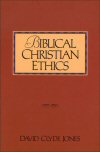
Biblical Christian Ethics
- Author: David Clyde Jones
- Publisher: Baker Academic
- Publication Date: 1994
- Pages: 224
After examining what Scripture teaches about the goal and motive of the Christian life, the author addresses moral dilemmas, human-life issues, sexuality, economic justice, and truthfulness.
“Jones’ volume can be studied with a good deal of profit, and let me add, ‘by all means, do study it.’”
—Henry Krabbendam (Westminster Theological Journal)
David Clyde Jones is professor emeritus of systematic theology and ethics at Covenant Theological Seminary.
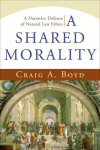
A Shared Morality: A Narrative Defense of Natural Law Ethics
- Author: Craig A. Boyd
- Publisher: Brazos Press
- Publication Date: 2009
- Pages: 272
Morality based on natural law has a long tradition, and has proven to be quite resilient in the face of numerous attacks and challenges over the years. Those challenges are no less serious today, which leads one to ask if natural law is still a viable foundation for ethics.
Craig Boyd provides a contemporary defense of natural law theory against modern challenges from the arenas of science, religion, culture, and philosophy. In his analysis, he defends many of the classical elements of natural law, but also takes into account the contributions of scientific discoveries about human nature. He concludes that natural law is a necessary but not sufficient basis for ethics that must be accompanied by a theory of virtue.
Craig A. Boyd’s A Shared Morality makes an important contribution to the literature on natural law and the virtues. Boyd offers a cogent and historically grounded account of why common human morality is best conceived along lines provided by the natural law tradition. He offers a clear normative thesis but is fair-minded to opposing positions and aware of the need for further work on the topic. This book will be especially interesting to those interested in issues of relativism, moral reasoning, and cross-cultural morality. It should be read by ethicists, theologians, and anyone concerned about the moral foundations of human rights and the common good.
—Stephen J. Pope, author, The Ethics of Aquinas
Natural law advocates and virtue 'theorists' have largely ignored one another. In this book, Boyd develops a constructive engagement between these positions to which I hope philosophers and theologians will attend. If they are like me, they will learn much from this book.
—Stanley Hauerwas, author, The Peaceable Kingdom: A Primer in Christian Ethics
Craig A. Boyd has developed a contemporary version of natural law ethics, drawing more on sociobiology and current concepts of nature than on Aristotelian metaphysics. Yet he follows Aquinas on the good life by tying natural law to virtue ethics, which in turn leads to a divine command theory of moral obligation. Add this to his vigorous response to analytic moral philosophy and to scientific and postmodern criticisms, and the result is a splendid treatment of contemporary philosophical ethics. The exposition is both clear and competent, his research thorough, and the argument persuasive. It's a book I strongly recommend for teacher and student alike.
—Arthur Holmes, professor emeritus of philosophy, Wheaton College
Craig A. Boyd is professor of philosophy and director of faith integration at Azusa Pacific University. He has published numerous journal articles and presented at many scholarly conferences.
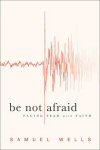
Be Not Afraid
- Author: Samuel Wells
- Publisher: Brazos Press
- Publication Date: 2011
- Pages: 224
Does God heal? Where do I turn when my faith is fragile? How can I face my own death? Is there a gospel for the rich? What am I going to do with my life? In brief, to-the-point chapters, preacher and ethicist Samuel Wells lucidly and compassionately explores topics Christians are often reluctant to face—death, weakness, power, difference, faith, and living life to the full—and offers down-to-earth guidance in facing common fears in the life of faith.“The heart of the gospel speaks into the most numbing and terrifying moments of our lives with words of hope and joy amid fear and bewilderment,” writes Wells. Encouraging readers to look deep into the questions of their lives and deep into the heart of God, this book provides an intellectually rigorous but Scripturally rooted and theologically accessible engagement with questions of faith. Pastors, seminarians, and all who want to know how the gospel can help them overcome common fears will value this work.
Sam Wells has given us good medicine in this book that both diagnoses the fears of our times and offers the remedy of the gospel. In these engaging and wise essays, Wells addresses not only our fear of death but also our fear of life in all its messy complexity. With a deft mix of storytelling, biblical interpretation, and theological reflection, Wells assiduously tells us the truth about the world—a truth we can face because the way beyond fear is not through denial but through patience, hope, and courage. This is a timely and much-needed book for a church tempted to make self-protection more important than discipleship.
—Scott Bader-Saye, Helen and Everett H. Jones Professor of Christian Ethics and Moral Theology, Seminary of the Southwest
A modern-day C. S. Lewis, Sam Wells draws us closer to God's story of eternal love in Be Not Afraid. At times bracing, at other times funny, his words plumb the dark depths of despair and offer hope without triviality, correction without cruelty. This book is a witty, vulnerable, challenging delight, a perfect bedtime companion in dark nights of the soul and a worthy friend when the lights come back on.
—Lillian Daniel, coauthor, This Odd and Wondrous Calling: The Public and Private Lives of Two Ministers
In this book of reflections, Samuel Wells makes profound theological insight and artful language seem effortless. Each essay is a gem, the product of deep thought and the wordsmith's craft. This book is so directly addressed to the reader's heart and mind, so precisely on target about the fears that ensnare us, that Wells comes across not as a distant thinker but as a wise, understanding, and compassionate friend.
—Thomas G. Long, Bandy Professor of Preaching, Candler School of Theology, Emory University
Samuel Wells is vicar of St. Martin-in-the-Fields Anglican Church at Trafalgar Square in London. He previously served as dean of the chapel and research professor of Christian ethics at Duke University. Wells is the author of several books, including Be Not Afraid, Improvisation: The Drama of Christian Ethics, and Transforming Fate into Destiny: The Theological Ethics of Stanley Hauerwas. He also coedited, with Stanley Hauerwas, The Blackwell Companion to Christian Ethics.
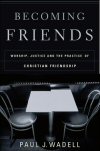
Becoming Friends: Worship, Justice, and the Practice of Christian Friendship
- Author: Paul J. Wadell
- Publisher: Brazos Press
- Publication Date: 2002
- Pages: 186
How do Christians understand friendship and intimacy? How does worship form Christians into a community of the friends of God? What virtues does God call us to incorporate into our lives? In Becoming Friends, Paul Wadell explores the connections between worship, justice, friendship, and the life we are called to live.
This engaging and accessible book offers a fresh viewpoint from which to explore the nature of Christian friendship. Such friendship, Wadell contends, is more than a bonding of people with similar interests, a “ritual of hopeless consolation.” True Christian friendship summons us to love all of our neighbors. Wadell examines obstacles to and characteristics of true friendship and, drawing from the works of Augustine, Aelred of Rievaulx, and other Christian exemplars, contends that we are called to serve God through friendship and that this calling requires us to cultivate certain virtues—especially hope, justice, and forgiveness.
Becoming Friends offers a provocative look into the nature and importance of true Christian friendship. Anyone looking to reflect on the indispensable role of good friendships in the Christian life will find this a hopeful and encouraging book.
Paul J. Wadell is among the most thoughtful and respected interpreters of Christian friendship. This work, like all his previous writing on the subject, is extraordinary for its insight, depth, and creativity.
—Stephen G. Post, professor, Case Western Reserve University
Paul Wadell's Becoming Friends is a work of grace and skill that gently invites us into friendship with God and one another. As he invites us, Wadell also quietly guides us, showing us the virtues and practices we will need if we are to be good friends. Most profoundly, with care and humility, Wadell explores the connection between worship and friendship lying at the very heart of the church. For Christians in all walks, Becoming Friends will provide great help, both in naming what is already rich and good in their lives and churches, and in drawing them nearer in friendship to God and each other.
—Charles R. Pinches, professor, University of Scranton
What a wonderful gift Paul Wadell has given us. In these pages, he enriches our imaginations by showing us both the gift that friendship is and the potentially transformative channel of God's grace that it might become if we were but freed from our culture's superficial and warped views of friendship. Filled with evocative examples and written with Wadell's remarkable blend of eloquence and humility, this is the kind of book that readers will return to again and again.
—Philip D. Kenneson, author, Life on the Vine
Paul J. Wadell is associate professor of religious studies at St. Norbert College, DePere, Wisconsin. His previous works include Friendship and the Moral Life, Friends of God: The Primacy of Love, and Morality.
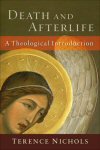
Death and Afterlife: A Theological Introduction
- Author: Terence Nichols
- Publisher: Brazos Press
- Publication Date: 2010
- Pages: 224
What happens to us when we die? Nothingness? Judgment? Heaven? Hell? Many people today fear dying and are uncertain about life after death because of challenges from the sciences, philosophy, and even theology. In this engaging and clearly written book, theologian Terence Nichols addresses contemporary and perennial human questions about death and what lies beyond, making a Christian case for an afterlife with God.
Nichols first examines views of death and the afterlife in Scripture and the Christian Tradition. He takes up scientific and philosophical challenges to the afterlife and considers what we can learn about it from near death experiences. Nichols then argues that the soul can survive death and that bodily resurrection is possible, explores how Christians can be worthy of salvation, and reflects on heaven, purgatory, and hell. He discusses death as a preparation for afterlife, providing readers with a theological guidebook for dying well. This book will benefit professors and students in theology, eschatology, practical theology, and pastoral care courses as well as pastors and priests.
Nichols is to be commended for this outstanding introductory text on death, the afterlife, and resurrection. His book is ambitious in the best senses of that term. It addresses a topic that Christians too often sheepishly neglect or, perhaps worse, speak of in simplistic platitudes and imagery that threaten the credibility of what are in fact intellectually sophisticated Christian beliefs on the life to come. The book is also ambitious in addressing every possible facet of its subject matter, including chapters on ancient Judaism, the New Testament, the Christian tradition, scientific challenges and responses, and even literature on ‘near death experiences.’ Quite evidently a gifted teacher, Nichols treats all of these topics in an accessible manner that is nonetheless clearly nourished by a command of available scholarship on these topics. In nearly every chapter, he presents a fair depiction of the continuum of contemporary positions on the question at hand. The text will be invaluable in university classrooms. Indeed, the book will reward all Christians seeking to better understand Christian belief about the next life, as well as seekers who would benefit from a clear and fair account of Christian belief on this topic in conversation with common contemporary objections from a multitude of disciplines.
—William C. Mattison III, assistant professor of moral theology, The Catholic University of America
As Terry Nichols recognizes in the opening pages of Death and Afterlife, and occasionally throughout, modern theologians tend to avoid the topics in this book. Nichols, however, takes them on with courage and clarity. As a systematic theologian, he rises to the challenge of facing deep human questions and tough contemporary doubts that nag around the edges of our systems of thought, trendy or not. But he does this above all because he is a deeply committed teacher who knows from years of conversation with students that the question of life after death has hardly gone away, if it ever could.
—Gerald W. Schlabach, associate professor of theology, University of St. Thomas
In a world where even some Christians are embarrassed by talk of life after death, Nichols makes a compelling case that the afterlife is integral to understanding how life really is. This book provides the enormously valuable service of digesting a wide variety of scholarship—from theology to neuroscience—and presenting all sides fairly and accurately. The reader encounters not only biblical views of death and afterlife but also startling debates about near death experiences. Nichols provides sound arguments for why traditional Christian views of the afterlife are viable today and gives us ways not only of dying well but also of living well.
—William T. Cavanaugh, professor of theology, University of St. Thomas
Terence Nichols (1941-2014) received his PhD from Marquette University and served as professor of theology at the University of St. Thomas for more than twenty-five years. He also founded and codirected the Muslim-Christian Dialogue Center at the University of St. Thomas. His books include That All May Be One: Hierarchy and Participation in the Church and The Sacred Cosmos: Christian Faith and the Challenge of Naturalism.
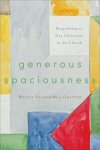
Generous Spaciousness: Responding to Gay Christians in the Church
- Author: Wendy VanderWal-Gritter
- Publisher: Brazos Press
- Publication Date: 2014
- Pages: 288
Committed Christians may respond differently to gay and lesbian Christians. How can we engage those with whom we might disagree and navigate our journey together in a way that nurtures unity, hospitality, humility, and justice?
Through her extensive experience in ministering to gay and lesbian Christians, Wendy VanderWal-Gritter has come to believe we need a new paradigm for how the church engages those in the sexual minority. She encourages generous spaciousness, a hope-filled, relational way forward for those in turmoil regarding a response to gay and lesbian Christians. This book offers a framework for discussing diversity in a gracious way, showing that the church can be a place that welcomes a variety of perspectives on the complex matter of human sexuality. It also offers practical advice for implementing generous spaciousness in churches and organizations.
I can't imagine a more timely book. Modeling the very 'generous spaciousness' that she advocates, VanderWal-Gritter's heart is on every page. The church is at a crucial moment of transition in relation to gay sisters and brothers, and this wonderfully written book will prove to be one of the most helpful guides in the midst of change. Profoundly and deeply biblical, theologically rich, and rooted in years of humble, respectful, and vulnerable listening, VanderWal-Gritter's wisdom is precisely what we so desperately need.
—Brian Walsh, Christian Reformed campus minister, University of Toronto; author, Kicking at the Darkness: Bruce Cockburn and the Christian Imagination
This book provides a model of how people can be agents of reconciliation within Christian communities that are polarized over how to relate to gays and lesbians.
—Tony Campolo, professor, Eastern University
'Loving people changes you,' says Wendy VanderWal-Gritter in this important new book. The author herself clearly has been changed by loving gay people, in a journey that began when she led a ministry in the 'ex-gay' movement. Now Wendy advocates a posture of 'generous spaciousness' and offers pastoral and relational insight from her time at the intersection of homosexuality and the church. This book is highly recommended for anyone who wants to minister in the world (and the church) we actually live in today.
—David Gushee, distinguished university professor of Christian ethics and director, Center for Theology and Public Life, Mercer University
Wendy VanderWal-Gritter has been executive director of New Direction Ministries of Canada in Mississauga, Ontario, for over a decade. She is an internationally recognized contributor to conversations about faith and sexuality and is an active speaker. She is currently completing her doctoral dissertation on the theme of generous spaciousness at Knox College, University of Toronto.
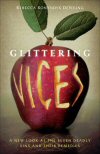
Glittering Vices: A New Look at the Seven Deadly Sins and Their Remedies
- Author: Rebecca Konyndyk DeYoung
- Publisher: Brazos Press
- Publication Date: 2009
- Pages: 208
“Moral formation” and “character development” are popular buzzwords, but they are ineffective concepts without an understanding of what good character is and how to cultivate it. The traditional teachings on the “seven deadly sins”, or capital vices, compiled by saints such as Augustine, Pope Gregory I, and Aquinas, offer a strong foundation for recognizing virtues to cultivate and vices to avoid.
Unfortunately, contemporary culture trivializes, psychologizes, or even dismisses the seven vices as if they have no serious moral or spiritual implications. Glittering Vices clears that misconception with a brief history of the vices and an informative chapter on each “deadly sin.” Readers gain practical understanding of how the vices shape our culture and why gluttony, lust, sloth, and others are, in fact, incredibly destructive. Through this eye-opening book, readers will be able to correctly identify and eliminate the deeply rooted patterns of sin that are work in their lives.
Winsome and wise, Glittering Vices is intriguing for any reader interested in spiritual disciplines and character formation. Its rich content makes it useful in undergraduate and seminary ethics courses as well.
This book is a treat for the mind and a tonic for the soul, recovering and refining riches in the Christian tradition almost lost from view. It is not often that one reads a work that is as intellectually deep and sharp as this one, but which is also intensely practical: helping its readers become the persons they were created to be.
—C. Stephen Evans, professor, Baylor University
Glittering Vices is a lucid, historically informed, and well-illustrated exploration of the seven deadly vices. DeYoung's book will unquestionably help teachers, students, and laypersons toward the Socratic and Christian goal of self-examination. This is an invaluable guide for anyone seeking self-understanding, spiritual growth, and philosophical insight.
—W. Jay Wood, professor, Wheaton College
Rebecca DeYoung here gives us an in-depth, informing, and frequently fascinating look at the vices and why they glitter. For the believer, reading her words will become, in and of itself, an act of spiritual formation.
—Phyllis Tickle, author, Greed
Rebecca Konyndyk DeYoung is associate professor of philosophy at Calvin College in Grand Rapids, Michigan. She wrote the “Seven Deadly Sins” entry for the Encyclopedia of Christianity and collaborated with two of her seminary students to develop a high school/college curriculum on the subject.
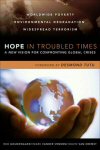
Hope in Troubled Times: A New Vision for Conflicting Global Crisis
- Author: Bob Goudzwaard, Mark Vander Vennen, and David Van Heemst
- Publisher: Baker Academic
- Publication Date: 2007
- Pages: 256
We want to have it all: financial strength, secure homes, clean air and water for our children. With the latest technological advances available, we deserve to have every dilemma resolved. Isn't that the way it's supposed to work? Hope in Troubled Times dares to say “no.”
Poverty, terrorism, and overtaxed land are planetary problems that make even believers despair. But the authors point to Christ as the source of hope. Our choice is obvious. We work together, learning to live unselfishly, or we watch civilization sink further into the abyss. With a foreword by renowned human rights activist Archbishop Desmond Tutu, Hope in Troubled Times provides real-world solutions to life-threatening problems. The authors show that with God's guidance we can knock down the idols that stunt clear thinking.
At a time when so many in our fragile, fractured, and violent world so understandably succumb to despair, rage, indifference, or escapism, this unsettling book issues an audacious manifesto of hope. Fired by a stirring biblical vision of shalom, the authors deploy their ample social science expertise to diagnose the idolatrous obsessions driving our global social, economic, and political crises and blocking their resolution. And they invite all of us—people of faith as well as those who open the book supposing they have none—to take the healing steps that already lie at hand. This book certainly afflicts the comfortable, but only so that the afflicted may indeed be comforted.
—Jonathan Chaplin, director of the Kirby Laing Institute for Christian Ethics, Tyndale House, Cambridge
These authors are spot on. Their words should be read widely!
—Njongonkulu W. H. Ndungane, Anglican archbishop, Cape Town, South Africa
The real struggle of our time is the choice between cynicism and hope. Hope in Troubled Times argues persuasively that the power and possibility of biblical hope offers a resolution to the problems of combating terrorism, global poverty, and environmental degradation. Its analysis and engaging narrative challenge us to find new solutions grounded in that hope rather than in the idolatrous ideologies of our times.
—Jim Wallis, author, God's Politics; editor, Sojourners
Bob Goudzwaard is professor emeritus of economics and social philosophy at the Free University of Amsterdam and a former member of the Dutch Parliament. His many books include Globalization and the Kingdom of God.
Mark Vander Vennen is a writer and social worker living in Ontario, Canada.
David Van Heemst is professor of political science at Olivet Nazarene University and the author of two books.
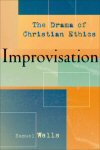
Improvisation: The Drama of Christian Ethics
- Author: Samuel Wells
- Publisher: Brazos Press
- Publication Date: 2004
- Pages: 236
“Improvisation.” We think of jazz—some bebop master following his horn in the genius of the moment. Or theater—an actor striking that authentic note by responding, on the spot, to the lines that came before his. But what does improvisation have to do with ethics
Samuel Wells defines improvisation in the theater as “a practice through which actors seek to develop trust in themselves and one another in order that they may conduct unscripted dramas without fear.” Wells suggests that such a definition is highly appropriate to Christian ethics.
He establishes theatrical improvisation as a model for Christian ethics, a matter of “faithfully improvising on the Christian tradition.” The Bible is not so much a script to rehearse as it is a “training school” that shapes the habits and practices of a community in action. Drawing on Scriptural narratives and church history, he details six practices that characterize both improvisation and Christian ethics—including categories such as “forming habits”,“questioning givens,” and “reincorporating the lost.” He concludes with specific examples of ethical issues, such as facing evil and the perils and promises of genetically-modified food.
Wells's fresh and imaginative discussion reinforces the goal of Christian ethics—not to “help someone act Christianly in a crisis” but to teach Christians to “embody their faith in the practices of discipleship all the time.”
This is one of the most relevant, stimulating and lucid books on Christian ethics to appear for some time. It provides an excellent introduction to current debates in Christian ethics while making its own vivid and sometimes controversial contribution. It is in many places profound and original, and it deserves to be widely read and discussed.
—Duncan B. Forrester, professor, University of Edinburgh
A book on improvisation cannot be a book about improvisation, but it must 'be' that which it is about. No easy task, but both the content and execution of Improvisation do what the book says. With concepts such as 'blocking' and 'overaccepting,' Wells provides us with skills for the imagination that we might live more faithful (and humorous) lives as Christians. Like all great improvisers, Wells has a gift for telling the right but unexpected story at the right time. This extraordinarily sophisticated book can be read for profit by those well schooled in the literature of theology and ethics, but more important, this book will satisfy those who hunger and thirst for an account of what it means to live as a Christian in our day.
—Stanley Hauerwas, professor, Duke Divinity School
Improvisation indeed. Bold, creative, and yet showing a deep mastery of his craft, Samuel Wells charts a fresh course for Christian theological ethics that is at once artful, contemporary, and faithful both to the Bible and to the best of Christian ethical reflection. While Wells rightly refuses to concede that Christian ethics is primarily about problem solving, he nevertheless offers back to the church its own imaginative resources for confronting the more intractable dilemmas of our age. This is a very important book.
—Michael Hanby, professor, Baylor University
Samuel Wells is vicar of St. Martin-in-the-Fields Anglican Church at Trafalgar Square in London. He previously served as dean of the chapel and research professor of Christian ethics at Duke University. Wells is the author of several books, including Be Not Afraid, Improvisation: The Drama of Christian Ethics, and Transforming Fate into Destiny: The Theological Ethics of Stanley Hauerwas. He also coedited, with Stanley Hauerwas, The Blackwell Companion to Christian Ethics.
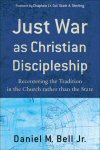
Just War as Christian Discipleship: Recentering the Tradition in the Church rather than the State
- Author: Daniel M. Bell Jr.
- Publisher: Brazos Press
- Publication Date: 2009
- Pages: 268
This provocative and timely primer on the just war tradition connects just war to the concrete practices and challenges of the Christian life. Daniel Bell explains that the point is not simply to know the just war tradition but to live it even in the face of the tremendous stresses and difficulties associated with war.
Just War as Christian Discipleship recovers contexts and specifics of the just war tradition that have been widely forgotten. Instead of seeing the tradition as a checklist to complete that justifies a proposed or ongoing war, Bell looks back to the aspects of the tradition that were about forming, supporting, and holding accountable Christians as just warriors. He shows how just war practice, if it is to be understood as a faithful form of Christian discipleship, must be rooted in and shaped by the fundamental convictions and confessions of the faith. The book includes a foreword by an Army chaplain who has served two tours in Iraq and study questions for group use.
Bell has written a book that I wish I'd had during my deployments. Just War as Christian Discipleship addresses the just war tradition in a way that not only adds to our knowledge of the historical roots of the tradition but also contributes to the Christian soldier's desire to embody the principles as lifestyle. . . . If the Christian community will take seriously Bell's call for a discipleship that embraces the just war tradition, we can all feel more confident that our nation will strive to maintain the moral high ground in its military endeavors and beyond.
—Lt. Col. Scott A. Sterling, chaplain, U.S. Army
By reframing just war as a discipline of Christian discipleship, Bell has breathed new life into the discussion surrounding this important topic. He has done so, moreover, in a manner that makes this book accessible to those well versed in the debates as well as those who are confronting these issues for the first time. We are in his debt.
—Stanley Hauerwas, Gilbert T. Rowe Professor of Theological Ethics, Duke Divinity School
Bell's Just War as Christian Discipleship demands a lot of us. It requires us to submit to a rigorous examination of ourselves, our church, and our nation in exploring how we might act justly before, during, and after war. It offers no excuses for those of us who either avoid any responsibility to ever use force or attempt to rationalize virtually every use of force. Bell advocates for just war as an extraordinarily difficult set of practices grounded in particular Christian theological and ecclesiological presuppositions. In this sense, the book is a prophetic critique of some secular versions of the just war tradition. Even more so, it is a prophetic critique of churches and church leaders for our failure to form communities capable of dealing with the real challenges of just war. Bell also calls for much more consultation between Christian churches and military personnel than is typical so that the churches can be more responsible in their pronouncements and military personnel can hear the churches' claims based upon a Christian understanding of the moral tradition of just war. I commend this book for study by bishops, clergy, and laity as an introduction to a dimension of Christian discipleship that is usually neglected because of our preoccupation with the institutional life of the church.
—Tim W. Whitaker, bishop, United Methodist Church
Daniel M. Bell Jr. is professor of theological ethics at Lutheran Theological Southern Seminary in Columbia, South Carolina. He is an ordained elder in the United Methodist Church and the author of Just War as Christian Discipleship and Liberation Theology after the End of History.
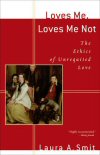
Loves Me, Loves Me Not: The Ethics of Unrequited Love
- Author: Laura A. Smit
- Publisher: Baker Academic
- Publication Date: 2005
- Pages: 266
It hurts when the one you love doesn't love you back. It's hard to be the object of someone's desires when you just don't feel the same way. How should Christians deal with these situations? There are hundreds of books describing how to build lasting relationships or how to lead a chaste life as a single person. There are very few books, however, describing how to deal with unrequited love. With Loves Me, Loves Me Not, Laura Smit fills this void.
Smit tackles this universal human experience with intelligence, sympathy, and wit. An accessible book, Loves Me, Loves Me Not will be an invaluable tool for youth pastors; singles group leaders; college students; and students of human sexuality, marriage and family, and Christian ethics.
Smit brings a chaste heart and a fecund imagination to the topic of romance and relationships. Society tells us that a love not returned is wasted, but Smit shows us just how much we have to learn from unrequited love. She examines the fragments of our love lives with the skill of a pastor and the gentle encouragement of a wise friend, giving us hope that unrequited love can teach us to turn our hearts to God. This is a beautiful book, weaving together personal stories with biblical theology and challenging insight. In a world of sexual experts and sexual excess, perhaps we have the most to learn from someone who is called to be single. Whatever your station in life, this book will move you as much as it will teach you. Read it and begin to love anew.
—Stephen H. Webb, professor of religion and philosophy, Wabash College
Simply smashing! Witty, intricate, and smart—this is the most important, thought-provoking book I have read this year.
—Lauren F. Winner, author, Girl Meets God and Real Sex
Smit presents a superb collection of individuals' experiences with romantic relationships and their beliefs about intimacy. The value of the work is that it shares new, revealing insights for all ages about beautiful, emotional romance—not sexual love—reasoning that romantic love and a moral, godly life are linked constructs. Smit correctly implies that life is a process of maintaining values in the face of a culture that loosens its norms by making love and sex one. This book is a must for any reader who seeks a deep and meaningful love.
—Bob Compton, professor emeritus, Valley Forge Military College
Laura Smit (Ph.D., Boston University) is dean of the chapel and assistant professor of theology at Calvin College. She is ordained in the Presbyterian Church (USA) and the Christian Reformed Church and has served in a variety of pastoral settings.
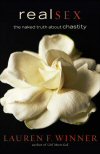
Real Sex: The Naked Truth about Chastity
- Author: Lauren F. Winner
- Publisher: Brazos Press
- Publication Date: 2006
- Pages: 192
SEX. Splashed across magazine covers, billboards, and computer screens-sex is thrilling, necessary, unavoidable. And everybody's doing it, right?
In Real Sex: The Naked Truth about Chastity, Lauren Winner speaks candidly to single Christians about the difficulty—and the importance—of sexual chastity. With nuance and wit, she talks about her own sexual journey. Never dodging tough terms like “confession” and “sin”, she grounds her discussion of chastity first and foremost in scripture. She confronts cultural lies about sex and challenges how we talk about sex in church.
Refusing to slink away from thorny topics, Winner deftly addresses pornography, masturbation, and the perennial question of “how far is too far?” Winner also digs deeper: What does chastity have to do with loving my neighbor? How does my sexual behavior form habits and expectations? With compassion and grit, she calls Christians, both married and single, to pursue chastity as conversion and amendment of life.
Real Sex will be an essential read for single Christians grappling with chastity, for married Christians committed to monogamy, and for those who counsel them. Discussion questions have been added to the paperback edition.
It is unquestionably impossible to write a book about sex that is as exciting as the topic itself. But Lauren Winner comes close. She has written a book of beauty, mystery, stern challenge, and great joy. And she has written it in a humble, honest, literate, elegant voice. I hope it finds many readers.
—John Ortberg, Menlo Park Presbyterian Church
Thank you, Lauren. Now we pastors have a book we can give with confidence to people we serve and lead who have questions about sexuality. It is gentle, firm, honest, candid, reverent, informed, wise, apt, warm, human, and--in the best sense of the word--spiritual.
—Brian McLaren, author of A New Kind of Christian, The Story We Find Ourselves In, and A Generous Orthodoxy
Edgy, smart, hip, gutsy. They are good words in and of themselves, and they certainly describe Lauren Winner's Real Sex. But so too do words like thoughtful, commanding, unflinching, and surgically insightful. Real Sex is far and away the most accessible, best argued, clearest exposition of Christian teaching on sexuality that I have read in years. I commend it to every contemporary Christian regardless of his or her age and stage in life.
—Phyllis Tickle, author of The Divine Hours
Lauren F. Winner is the highly acclaimed author of the memoir Girl Meets God. She is assistant professor of Christian spirituality at Duke Divinity School in Durham, North Carolina, and has written for the New York Times Book Review, the Washington Post Book World, Publishers Weekly, Christianity Today, and Christian Century.
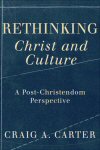
Rethinking Christ and Culture: A Post-Christendom Perspective
- Author: Craig A. Carter
- Publisher: Brazos Press
- Publication Date: 2006
- Pages: 224
Few books have been used as broadly in Christian colleges and seminaries in the past half century as H. Richard Niebuhr's Christ and Culture. His five classic typologies of how Christ can relate to culture—Christ against culture, Christ in “paradox” with culture, and so on—have influenced two generations of Protestant and Catholic thinkers.
But in recent decades scholars have become aware that Niebuhr's typologies need to be rethought in light of changing circumstances. While Niebuhr wrote at a time when it was still possible to speak of Christendom, Christianity since that time has held less and less sway over American and European intellectuals and other shapers of culture. As such, Christianity has found itself increasingly marginalized.
In this work, Craig Carter follows in Niebuhr's footsteps, using typology to explore the crucial question of how Christians should relate to the world. However, he goes beyond Niebuhr to offer an alternative typology that is arguably more deployable in our post-Christian society. This book is a useful text for college and seminary courses and for any Christian who seeks to understand how to share a timeless message in changing times.
H. Richard Niebuhr's days are numbered. Or so one can only imagine. This carefully argued and well-written book should bring the curtains down on the more than 50 year reign of Niebuhr's typology in Christ and Culture. Carter not only shows how this paradigm is inadequate for our world but offers an alternative paradigm that is at once fuller and richer for understanding the church's social existence in the midst of a broken world that is loved by God.
—Mark Thiessen Nation, author,John Howard Yoder: Mennonite Patience, Evangelical Witness, Catholic Convictions
Craig Carter has written an important book for everyone under the influence of H. Richard Niebuhr's Christ and Culture, for everyone committed to the church's witness in the world, and for everyone concerned about the impact of Christianity upon our common life. In our tumultuous times, we should welcome his critique of Niebuhr, heed his call to faithful Christian witness, and emulate his care for our common life.
—Jonathan R. Wilson, author, God So Loved the World
This book is long overdue and much needed. Even though few works of contemporary theology are as influential as Niebuhr's Christ and Culture, there has been surprisingly little serious criticism of its main claims and organizing categories. Carter's stimulating book provides not only a provocative critique of Niebuhr's entire approach, it also breaks new ground by proposing an alternative understanding of the main options for the church's mission to the world. Anyone who reads Niebuhr's classic should also read this book. This book deserves the careful attention of pastors, theologians, and every student of Christian thought and ethics.
—Jeffrey P. Greenman, professor, Wheaton College
Craig A. Carter is associate professor of religious studies at Tyndale University College and Seminary in Toronto, Ontario, and author of The Politics of the Cross.
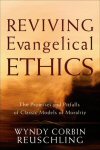
Reviving Evangelical Ethics: The Promises and Pitfalls of Classic Models of Morality
- Author: Wyndy Corbin Reuschling
- Publisher: Brazos Press
- Publication Date: 2008
- Pages: 188
The classic theories of Aristotle, Kant, and Mill have influenced Christian thought in morality and ethics for centuries. But they can go only so far, writes ethicist Wyndy Corbin Reuschling in Reviving Evangelical Ethics: The Promises and Pitfalls of Classic Models of Morality. In this readable book she introduces and overviews the three classic philosophical schools of ethics: virtue, deontology, and teleology.
While the philosophers’ approaches to virtue, duty, and utility have been used widely in forming ethical and moral practices, and are helpful for understanding various dimensions of ethics, Corbin Reuschling argues that they also have limitations from a theological perspective. These theories cannot account for the richness of Christian morality, which involves Scripture, the church, and the development of conscience for increasing skills in moral reflection and ethical deliberation. The author shows how evangelicals wittingly or unwittingly fall into one or another of the classic models without adequate biblical and theological reflection, probes deeply to deconstruct each philosophical approach, and reconstructs a broader, biblically based framework for personal and group ethics. This clear and accessible introductory ethics text will serve college and seminary students well.
This book honors evangelical commitments to the authority of Scripture, to a personal relation with Jesus, and to evangelism. But it challenges some of the ways evangelicals have brought those commitments to bear on Christian ethics, and it suggests better ways, ways that might indeed revive evangelical ethics.
—Allen Verhey, professor, Duke University
Combining appreciation and critique, Wyndy Corbin Reuschling skillfully teases out the particular dynamics at work in the moral thinking of many evangelicals. By carefully analyzing the impact of several moral traditions on evangelicalism, she invites readers into a fuller recognition of the shaping power of scripture and Christian community, and into more robust practices of Christian discipleship. This book is an important contribution to understanding and strengthening evangelical ethics.
—Christine D. Pohl, professor, Asbury Theological Seminary
Reviving Evangelical Ethics offers an appreciative but rigorous critique of the ways that classical moral theory has limited ethics to reflection on the demands of duty, the achievement of certain results, or personal virtue. It is a positive call to obey the fuller moral vision of the Kingdom of God expressed throughout the scriptures and, above all, in the teaching and ministry of Jesus, whose own moral and ethical concerns are often eclipsed by preoccupation with the narrow moral issues thrust to the foreground by evangelical churches' entangling political alliances, or by the battle for individual souls at the expense of a full-bodied engagement with social justice. In this incisive and prophetic book, Corbin Reuschling calls for the deeper development of conscience and moral discernment among Christ-followers through sustained engagement with scripture, intentionally diverse Christian community, and involvement in specific acts of service, all of which help us grow in our awareness of the concerns of those not like us and thus broaden our moral perspective. This important book redefines the boundaries of evangelical ethics in salutarily progressive ways, while raising timely cautions concerning the therapeutic models of spiritual formation that further inhibit the development of the social dimension of Christian ethics.
—David A. deSilva, professor, Ashland Theological Seminary
Wyndy Corbin Reuschling (PhD, Drew University) is professor of ethics and theology at Ashland Theological Seminary. She is the author of Reviving Evangelical Ethics: The Promises and Pitfalls of Classic Models of Morality and has written for publications such as The Journal of the Society of Christian Ethics and Ashland Theological Journal.
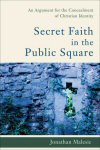
Secret Faith in the Public Square: An Argument for the Concealment of the Christian Faith
- Author: Jonathan Malesic
- Publisher: Brazos Press
- Publication Date: 2009
- Pages: 256
In this groundbreaking and provocative book, Jonathan Malesic examines the tradition and practice of keeping faith separate from public life. Going against the general theological trend of advocating an ever more visible presence for Christianity in American public life, he argues that the best way for Christians to be caretakers of their tradition and to love their neighbors selflessly is to conceal their religious identity in the public square. The alternative—insisting on Christianity’s public visibility in politics, the marketplace, and the workplace—risks severely compromising the distinctiveness of Christian identity.
Delving deep into the Christian tradition, Malesic explains that keeping Christian identity secret means living fully in the world while maintaining Christian language, prayer, and liturgy in reserve. He shows how major thinkers—Cyril of Jerusalem, Søren Kierkegaard, and Dietrich Bonhoeffer—sought to protect Christian identity from being compromised by the public sphere. He then shows that Christians' dual responsibilities for the tradition and for the neighbor must be kept secret.
Against all the arguments that religious conviction should be manifest in public life, Jonathan Malesic offers perhaps the most theologically profound, fruitful, and rigorous challenge: the real truth of Christianity cannot be worn like a flag pin on a politician's lapel. It occurs in secret and in silence. True subjectivity of faith precludes its manifestation in public life, and all attempts to display it in such a way only profane it and further pervert the church as a community of ‘secret disciples.’ This genuinely fresh, freethinking book displays the independence of mind and life for which it argues. Lucidly written and crisply argued, it is a significant contribution to discussions in the field and will be a wonderful counterpoint to the dominant narrative in classes about religion and public life.
—Charles Mathewes, associate professor of religious studies, University of Virginia; editor, Journal of the American Academy of Religion
Using ‘secrecy’ in the positive sense of one who can ‘keep a secret,’ Malesic explores ways in which believers can properly bring the resources of their faith to animate the societies of which they are a part. Reminiscent of the “Letter to Diognetus,” the strategy he proposes would eschew any overt attempts at ‘witness’ precisely to safeguard the integrity of the task entrusted to believers to act as leaven. Yet what of those institutions through which Christians have long sought to leaven the society of which they are a part? Going on to explore how this strategy would apply to them should offer strategies to move beyond the crypto-Christendom he seeks to avoid.
—David Burrell, CSC, professor of ethics and development, Uganda Martyrs University
Malesic's thesis is striking and provocative: we should conceal our faith in order to protect it from being absorbed and prostituted in our voracious secular culture. Readers may not be persuaded, but by the end of the book they will find themselves richly rewarded with many fresh insights into the possibilities for Christian witness in our strange, postmodern era. A truly fresh contribution to the important debate about faith, politics, and culture.
—R. R. Reno, professor of theological ethics, Creighton University
Jonathan Malesic is assistant professor of theology at King's College in Wilkes-Barre, Pennsylvania. He has written several essays for the Chronicle of Higher Education.
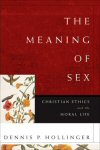
The Meaning of Sex: Christian Ethics and the Moral Life
- Author: Dennis P. Hollinger
- Publisher: Baker Academic
- Publication Date: 2009
- Pages: 272
Our culture is sex-crazed. That is no secret. But our culture is also deeply confused about sex and sexual ethics, often sending conflicting messages—at times promoting an “anything goes” attitude while at other times seeking to impose limits on sexual behavior. Unfortunately, Christians seem equally confused, and the church has tended to respond with simplistic answers. The reason for this confusion is that the meaning of sex has been largely lost.
Dennis Hollinger argues that there is indeed an inherent, God-given meaning to sex. This meaning provides a framework for a biblical sexual ethic that adequately addresses contemporary moral issues. Written primarily as a textbook for Christian college and seminary courses in ethics and human sexuality, The Meaning of Sex provides a good balance between theological reflection and engaging discussion of the practical issues Christians (especially students) are facing. Part 1 lays the groundwork, discussing ethical theories and the competing worldviews that shape various approaches to sexual morality. The Christian worldview of creation, fall, redemption, and consummation is then applied to sex, followed by an exploration of the God-designed purposes for sex. Part 2 delves into critical issues: premarital sex, sex within marriage, homosexuality, reproductive technologies, and faithful living in a sex-obsessed world.
Dennis Hollinger does the world a wonderful service by helping us all to understand the liberating good news of what sex can be. People must still choose whether to embrace this good news. But many are likely never to know about it without reading this book, which in turn will point them to the meaningful counsel of the One who created sex in the first place.
—John F. Kilner, Forman Chair of Ethics and Theology, professor of bioethics and contemporary culture, Trinity International University
Debates and dialogues about sexual ethics spin in circles unless we clarify 'the meaning of sex.' Indeed, what sets apart a truly Christian sexual ethic is that it is founded on the distinctive meanings of sex and sexuality established by God and revealed in the Scriptures. Hollinger's book articulates these foundations persuasively and then mines them to clarify the most pressing ethical and moral challenges facing the church today. This is a wonderful sourcebook for thinking Christians.
—Stanton L. Jones, provost, Wheaton College; author, Ex-Gays? and God's Design for Sex
Dennis Hollinger has put sex in its place. In societies such as ours, in which sex has become both all-consuming and trivial, Hollinger locates the meaning of sex in the context of a Christian worldview that takes seriously the goodness of created bodies and the gift of sexuality along with limitations on what we should do with our bodies and those of others. Hollinger provides a broad and thoroughgoing analysis of various frameworks played out in sexual practices and continually points readers to God's intended purposes for sexual expression in the context of marriage. This book is an important resource that offers us rich theological and moral language to make normative judgments about the expression of human sexuality based on the witness of Scripture, Christian tradition, reason, and experience. Characteristic of Hollinger's pastoral proclivities, he also offers helpful suggestions for churches desiring to help Christians find their way in a 'sex-crazed world.
—Wyndy Corbin Reuschling, associate professor of ethics and theology, Ashland Theological Seminary
Dennis P. Hollinger is president and Colman M. Mockler Distinguished Professor of Christian Ethics at Gordon-Conwell Theological Seminary in South Hamilton, Massachusetts, and is a former pastor. He is the author of numerous articles and the author or series coeditor of several books, including Head, Heart, and Hands: Bringing Together Christian Thought, Passion, and Action.
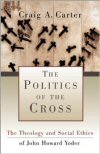
The Politics of the Cross: The Theology and Social Ethics of John Howard Yoder
- Author: Craig A. Carter
- Publisher: Brazos Press
- Publication Date: 2001
- Pages: 256
In this first systematic treatment of John Howard Yoder's extensive writings, Craig Carter argues that Yoder's radical social ethic, centered on pacifism, is derived from a classically orthodox Christianity.
We are in Carter's debt for this carefully researched and thorough study of Yoder's theology and social ethics. The Politics of the Cross has set the standard for excellence for what a theological assessment of Yoder's body of work should be.
—Dr. Michael G. Cartwright, professor, University of Indianapolis
There are no doubt going to be many books in the future published on Yoder, but this will surely be one of the best.
—Stanley Hauerwas, professor, Duke University
Careful, irenic, and argued with intellectual vigour, Carter's study gives a coherent reading of Yoder's Christocentric moral vision which will provoke debate and renewed appreciation for its subject.
—John Webster, professor, University of Oxford
Craig A. Carter is the vice president and academic dean at Tyndale College in Toronto, Ontario, where he also teaches theology and ethics.
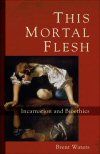
This Mortal Flesh: Incarnation and Bioethics
- Author: Brent Waters
- Publisher: Brazos Press
- Publication Date: 2009
- Pages: 208
We may be entering a golden age in healthcare thanks to dramatic improvements being made in diagnostic procedures and therapies. Many individuals will soon live longer, healthier, and more productive lives. But do these advances also bring the risk of losing one's humanity? Could this progress require the transformation of humans into a new and different species?
In many respects, medicine serves as a surrogate religion in today's societies. Although a proper concern for health is compatible with Christian faith, recent and anticipated advances in extending human longevity are often based on philosophical presuppositions and religious values that are adverse to core Christian beliefs and convictions. In This Mortal Flesh, theologian and ethicist Brent Waters examines the Christian moral life in light of critical bioethical issues, such as biotechnology and physical/cognitive enhancement, reproductive technology, human genetics, embryonic stem cell research, and regenerative medicine. He also examines the “posthuman project,” exploring what it means to be human in light of the denial of mortality. Grounding his theological reflections in the doctrine of the incarnation, Waters argues that it is good to be embodied, finite, and mortal.
This Mortal Flesh represents the distillation of much fine thinking. Brent Waters is concerned less with resolving bioethical dilemmas and more with probing the significance for medicine of the fundamental Christian claim that the Word became flesh. The result is an unusually illuminating display of Christian wisdom concerning technological ambitions that puts in question the meaning of humanity itself.
—John Webster, University of Oxford
Brent Waters is Jerre and Mary Joy Stead Professor of Christian Social Ethics at Garrett-Evangelical Theological Seminary in Evanston, Illinois, where he also directs the Jerre L. and Mary Joy Stead Center for Ethics and Values. He is ordained in the United Church of Christ; has authored, edited, or contributed to many books; and serves on the advisory board of Christian Bioethics.
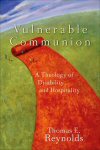
Vulnerable Communion: A Theology of Disability and Hospitality
- Author: Thomas E. Reynolds
- Publisher: Brazos Press
- Publication Date: 2008
- Pages: 256
As parents of a son with disabilities, Thomas Reynolds and his wife know what it's like to be misunderstood by a church community. In Vulnerable Communion, Reynolds draws upon that personal experience and a diverse body of literature to empower churches and individuals to foster deeper hospitality toward persons with disabilities.
Reynolds shows that the Christian story is one of strength coming from weakness, of wholeness emerging from brokenness, and of power in vulnerability. Wholeness, he argues, comes not from self-sufficiency, but from the “genuinely inclusive communion” that results from sharing our humanity—including our lack of ability—with one another. Then, and only then, will we truly live in hospitality with one another and with people with disabilities.
Reynolds offers valuable biblical, theological, and pastoral tools to understand and welcome those with disabilities. The book will be useful to academics, students, and pastors, as well as anyone touched by disability in some way. Readers will find penetrating examinations of the difficult questions of why God allows disability and what the church can learn from people with disabilities.
Vulnerable Communion is subversive theology in the tradition of the prophets speaking from the margins of society. It calls the church to confront and dismantle the (world’s) “cult of normalcy,” within which the church has uncritically worshipped. It also calls for a theology of disability that not merely insists on caring for people with disabilities but that allows the experience of disability to interrogate its theology of power. The result is a long-awaited and much-needed theological revisioning of the traditional doctrines of God, Christ, creation, redemption, and church so that the true power of the gospel is released from the underside of history once again.
—Amos Yong, book review editor, Journal of Religion, Disability and Health; associate research professor of theology, Regent University School of Divinity
Disability is a gift that forces us to rethink what we thought was settled. The worship of a crucified savior in a similar manner forces us to rethink what we thought was settled. It is to Reynolds’s great credit, therefore, that he helps us see how disability and the gospel are inseparably linked just to the extent that they both force us to recognize our vulnerability. It will be a shame if this book is read only by those concerned about disability, because Reynolds’s reflections are crucial for any work in constructive theology.
—Stanley Hauerwas, professor, Duke Divinity School
What we call disability is part of our fragile life and also of life’s mystery in God. To understand disabled people and our own vulnerability and to understand the vulnerable and compassionate God condition each other. This astonishing book serves both sides and is an insightful contribution to an all-embracing theology of life.
—Jürgen Moltmann, professor, University of Tübingen
Thomas E. Reynolds is associate professor of theology at Emmanuel College in the Toronto School of Theology, University of Toronto. He lives in North York, Ontario.
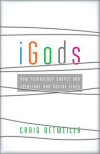
iGods: How Technology Shapes Our Spiritual Lives
- Author: Craig Detweiler
- Publisher: Brazos Press
- Publication Date: 2013
- Pages: 256
Today the world is literally at our fingertips. We can call, text, email, or post our status to friends and family on the go. We can carry countless games, music, and apps in our pocket. Yet it’s easy to feel overwhelmed by access to so much information and exhausted from managing our online relationships and selves.
Craig Detweiler, a nationally known writer and speaker on media issues, provides needed Christian perspective on navigating today's social media culture. He interacts with major symbols, or “iGods,” of our distracted age—Google, Facebook, Amazon, Apple, Pixar, YouTube, and Twitter—to investigate the impact of the technologies and cultural phenomena that drive us. Detweiler offers a historic look at where we’ve been and a prophetic look at where we're headed, helping us sort out the immediate from the eternal, the digital from the divine.
This is a wonderfully engaging romp through the largely American hills and valleys where theology and technology meet—a splendid contribution to the emerging conversations about what constitutes the good life in this age of information and communication technologies.
—Quentin Schultze, Calvin College; author of Habits of the High-Tech Heart: Living Virtuously in the Information Age
Craig Detweiler is one of the best at interlacing theology and popular culture. With books on film and on gaming, and as the coauthor of a best-selling survey of the field, he now turns to consider technology and its effect on our lives. Is technology a gift or a curse? As we all sense, it is both. Engaging, well-researched, theologically probing, and sensitive to cultural change without either defensiveness or fawning, iGods will inform both addict and skeptic.
—Robert K. Johnston, professor of theology and culture, Fuller Theological Seminary; author of Reel Spirituality
This volume has a timely aim: to temper the accelerations, distractions, temptations, and vulgarities of the Digital Age with a heedful remembrance of the Word of God. As digital tools creep down the age ladder all the way to toddlerhood and invade every space and hour of adulthood, Detweiler argues that conscientious people risk two extremes: succumbing to the avalanche or rejecting it outright. Neither one preserves what is best in digital experience, but we need a higher authority than ourselves to negotiate the right via media. Detweiler explains where that authority lies and in doing so provides one of the most important lessons in our time.
—Mark Bauerlein, author, The Dumbest Generation: How the Digital Age Stupefies Young Americans and Jeopardizes Our Future
Craig Detweiler is an author, award-winning filmmaker, and cultural commentator who has been featured in the New York Times, on CNN, and on NPR. He is professor of communication and director of the Center for Entertainment, Media, and Culture at Pepperdine University in Malibu, California. Detweiler is the author of Into the Dark: Seeing the Sacred in the Top Films of the 21st Century, coauthor of A Matrix of Meanings, and editor of Halos and Avatars.
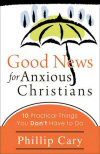
Good News for Anxious Christians: 10 Practical Things You Don't Have to Do
- Author: Phillip Cary
- Publisher: Brazos Press
- Publication Date: 2010
- Pages: 224
Like a succession of failed diet regimens, the much-touted techniques that are supposed to bring us closer to God “in our hearts” can instead make us feel anxious, frustrated, and overwhelmed. How can we meet and know God with ongoing joy rather than experiencing the Christian life as a series of guilt-inducing disappointments?
Drawing on his work with college students, Phillip Cary shows Christians that discipleship is a gradual, long-term process that comes through the Bible experienced in Christian community, not a to-do list designed to help them live the Christian life “right.” This lucidly written book covers ten things Christians don't have to do to be close to God, such as hear God’s voice in their hearts, find God’s will for their lives, and believe their intuitions are the Holy Spirit. Presenting a time-honored approach to the gospel that is beautiful and liberating, Cary skillfully unpacks the riches of traditional Christian spirituality to bring the real good news to Christians of all ages.
Yes! No! Whoa! There are so many terrific, alarming, insightful zingers in this book that I agreed, disagreed, and most of all, had to think about something on every page. Graceful and liberating, it is a word of wisdom and hope that just might convince anxious Christians that the gospel really is better news than we've yet imagined.
—Andy Crouch, senior editor, Christianity Today International; author, Culture Making: Recovering Our Creative Calling
Evangelicals worry about lots of things, including the state of our spiritual health. Phil Cary is worried too: worried that evangelicals are suffering needlessly because they have imbibed a consumerist spirituality that offers much but provides little. Phil's prescription for spiritual indigestion? A turning away from the self to the one who continually speaks a healing, saving word to us, Christ himself. This is, quite frankly, one of the best books I've read on the spiritual life over the past twenty-five years. I heartily recommend it.
—Christopher A. Hall, chancellor, Eastern University
Phillip Cary has clearly and convincingly explained why so many evangelicals are anxious and believe they may be failing at faith. I highly recommend this book to my fellow Christian counselors and self-doubting Christians because Cary richly explains the comforting good news of our identity in Christ. He thus provides a solid theological basis for correcting many deeply distorted beliefs about the self that propagate anxiety. This book provides the best treatment of this subject that I have ever read.
—Christopher Doriani, licensed clinical social worker
Phillip Cary is professor of philosophy at Eastern University in Pennsylvania as well as scholar-in-residence at the Templeton Honors College. He is the author of Jonah in the Brazos Theological Commentary on the Bible and of three critically acclaimed books on the life and thought of Augustine.
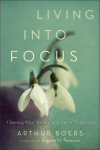
Living into Focus: Choosing What Matters in an Age of Distractions
- Author: Arthur Boers
- Publisher: Brazos Press
- Publication Date: 2012
- Pages: 250
In today’s high-speed culture, there's a prevailing sense that we are busier than ever before and that the pace of life is too rushed. Most of us can relate to the feeling of having too much to do and not enough time for the people and things we value most. We feel fragmented, overwhelmed by busyness and the tyranny of gadgets.
Veteran pastor and teacher Arthur Boers offers a critical look at the isolating effects of modern life that have eroded the centralizing, focusing activities that people used to do together. He suggests ways to make our lives healthier and more rewarding by presenting specific individual and communal practices that help us focus on what really matters. These practices—such as shared meals, gardening, hospitality, walking, prayer, and reading aloud—bring our lives into focus and build community. The book includes questions for discernment and application.
It’s one thing to clear a piece of land, move the rocks, rake the soil, and protect it with a fence. It’s another to bring it to life with berry-bearing bushes, exuberant tubers, vigorous vegetables, and many-splendored flowers. It's that second thing that Arthur Boers has done; he’s taken a theory and made it fruitful.
—Albert Borgmann, professor, University of Montana
Arthur Boers has written an insightful, wise, and practical book for people who are feeling exhausted, bored, fragmented, or simply lost in a world of unending busyness and distraction. It is a gift for all of us who want to focus our lives on the places, people, and practices that deeply matter and that give honor to God.
—Norman Wirzba, research professor of theology, ecology, and rural life, Duke Divinity School
I've been waiting for someone to write this important book. Herein Arthur Boers alerts us to the astonishingly overlooked “quiet desperation” afflicting our lives through the incessant distractions offered by our technological age. And he offers us practices that make space for grace and beauty and focus, which is to say, practices that create the sort of wealth that is the true longing of humankind.
—Lee C. Camp, author, Who is My Enemy? and host of TokensShow.com
Arthur Boers is associate professor and R. J. Bernardo Family Chair of Leadership at Tyndale Seminary in Toronto, Ontario. He served as a pastor for sixteen years and is the award-winning author of numerous articles and six books, including The Way Is Made by Walking and The Rhythm of God's Grace. He speaks regularly at churches, conferences, and retreats.
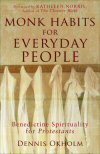
Monk Habits for Everyday People: Benedictine Spirituality for Protestants
- Author: Dennis L. Okholm
- Publisher: Brazos Press
- Publication Date: 2007
- Pages: 144
When Dennis Okholm began exploring the roots of contemporary Benedictine monasticism, he quickly found that St. Benedict has as much to offer Protestants as he does Roman Catholics. In Monk Habits for Everyday People, Okholm—a professor who was raised as a Pentecostal and a Baptist—uses his profound experience with Benedictine spirituality to show how it can enrich the lives and prayer practices of Protestants.
Okholm unpacks the Rule of St. Benedict—a practical guide for living the Christian faith and cultivating Christian virtue—by reflecting on aspects of spirituality such as listening, poverty, obedience, humility, hospitality, stability, and balance. His insights are invaluable to contemporary Christians, who, Okholm observes, have become consumers of religion rather than cultivators of a spiritual life. Readers will emerge not only with the desire to use the habits of monks to enhance their discipleship but also with the tools to start them on the journey.
Candid and engaging, Monk Habits for Everyday People is a valuable guide for Protestants seeking an accessible introduction to this classical resource for spiritual growth.
Twenty years in the making, Dennis Okholm’s Monk Habits is the perfect introduction to Benedictine spirituality for the earnest Protestant believer. In taking us on his own journey, he invites us to discover Benedict of Nursia and Benedict’s myriad faithful followers over fifteen centuries. This represents an important bridge between evangelicalism and Catholicism. Highly recommended.
—Tony Jones, author, The New Christians: Dispatches from the Emergent Frontier
The practices of Benedictine monasticism have several times brought revitalization and spiritual focus back to the worldwide church at large. In this informative and irenic book, Dennis Okholm explains how the ‘rule’ of Benedict did the same for him personally as an evangelical professor and Presbyterian minister. The book’s winsome portrait of the Benedictines—and, through their monastic practices, of Christ—makes for a spiritual feast. The historically minded will also benefit from Okholm's careful discussion of why more Protestants should pay greater heed to the Benedictine life.
—Mark A. Noll, coauthor, Is the Reformation Over? An Evangelical Assessment of Contemporary Catholicism
Dennis Okholm, a Benedictine oblate, speaks frequently in church and youth group settings and serves as assistant pastor at Holy Trinity Anglican Church in Costa Mesa, California. He is also professor of theology at Azusa Pacific University and adjunct professor at Fuller Theological Seminary. Okholm is the author or editor of many books, including Monk Habits for Everyday People.
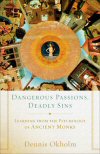
Dangerous Passions, Deadly Sins: Learning from the Psychology of Ancient Monks
- Author: Dennis L. Okholm
- Publisher: Brazos Press
- Publication Date: 2014
- Pages: 240
This volume unpacks the psychological insights found in the writings of three early monks—Evagrius Ponticus (fourth century), John Cassian (fifth century), and Gregory the Great (sixth century)—to help us appreciate the relevance of these monastic writers and apply their wisdom to our own spiritual and psychological well-being. The book addresses each of the seven deadly sins, offering practical guidance from the early monastic tradition for overcoming these dangerous passions.
As Dennis Okholm introduces key monastic figures, literature, and thought of the early church, he relates early Christian writings to modern studies in psychology. He shows how ancient monks often anticipated the insights of contemporary psychology and sociology, exploring, for example, how their discussions of gluttony compare with current discussions regarding eating disorders. This book will appeal to readers interested in spirituality, early monastic resources, and ancient wisdom for human flourishing, as well as students of spirituality and spiritual formation.
Dennis Okholm's Dangerous Passions, Deadly Sins is a welcome addition to the growing Christian psychology corpus. Christian counseling needs better roots, and Dennis Okholm reminds us of the classic nature of what is at the heart of humans—a tendency to move away from the heart of God—and the fact that some of the best Christian psychologists lived before modern psychology was born.
—Gary W. Moon, executive director, Martin Institute and Dallas Willard Center, Westmont College; author, Apprenticeship with Jesus
Okholm is both a careful and a broadly informed student of his subject, and the result of that happy combination is as intriguing and informing an overview of human foibles as I have ever seen. Pastoral as well as informative—in places even gentle—Dangerous Passions, Deadly Sins gives us a theology both of human frailty and of the full panoply of yearnings resident in us as a species. In effect, it also gives contemporary psychology and especially Christian counseling their deep history by paralleling the contemporary with the ancients of the faith.
—Phyllis Tickle, author, The Great Emergence, Emergence Christianity, and Greed
Dennis Okholm sets his treatment of the seven deadly sins in conversation with ancient monastic wisdom, godly psychological principles, and biblical truth. In so doing, he does not merely condemn vice but gently commends virtue and prayer to accompany us on a journey to the heart's true home: a life derived from and lived in the kingdom of God. It only takes a quick look at the news headlines or our interpersonal relationships to know that a fresh word on ethics is needed. I recommend Dangerous Passions, Deadly Sins to anyone searching for such a word.
—Todd Hunter, Anglican bishop; author, Our Favorite Sins
Dennis Okholm, a Benedictine oblate, speaks frequently in church and youth group settings and serves as assistant pastor at Holy Trinity Anglican Church in Costa Mesa, California. He is also professor of theology at Azusa Pacific University and adjunct professor at Fuller Theological Seminary. Okholm is the author or editor of many books, including Monk Habits for Everyday People.
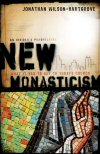
New Monasticism: What It Has to Say to Today's Church
- Author: Jonathan Wilson-Hartgrove
- Publisher: Brazos Press
- Publication Date: 2008
- Pages: 160
“It's hard to be a Christian in America,” writes Jonathan Wilson-Hartgrove, a leader in the new monasticism movement in America, a growing group of committed Christians who are living lives of radical discipleship.
However, the movement doesn't mirror traditional monasteries--many members are married with children and have careers, yet they live differently, often in community in once-abandoned sections of society.
Wilson-Hartgrove founded a new monastic community and works with an alternative theological collaborative. In this book, he takes readers inside new monasticism, tracing its roots through scripture and history and illuminating its impact on the contemporary church. “Monasticism isn't about achieving some sort of individual or communal piety. It's about helping the church be the church,” he writes. A must-read for new monastics or those considering joining the movement, this book will also appeal to 20- and 30-somethings, pastors, leaders, and those interested in the emerging church.
It is my sincere hope that new monasticism will grow so strong and healthy and widespread that every follower of Jesus in every church has the opportunity, if not to actually live in a new monastic community, to at least have enough proximity and relationship to be influenced by it. This book can help that dream and prayer come true.
—Brian McLaren, author, Everything Must Change
This book demonstrates how embracing the lifestyle prescribed by Jesus is a realistic possibility in our present age. It also shows how countercultural Christianity can provide a needed critique of our self-centered, consumerist society.
—Tony Campolo, professor, Eastern University
This book is a scavenger hunt into Christian history and the abandoned places of Empire where the Spirit is stirring today. It's like digging around in the dirt trying to find the pearl we buried, the pearl that is so beautiful it's worth giving up everything else in the world for.
—Shane Claiborne, author, The Irresistible Revolution
Jonathan Wilson-Hartgrove is a leader of the new monastic movement and cofounded the Rutba House community in Durham, North Carolina. An associate minister at St. John's Baptist Church in Durham, he is also the coordinator of the School for Conversion, a partnership among new monastic communities for alternative theological education. He is the author of To Baghdad and Beyond and Inhabiting the Church.
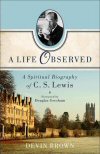
A Life Observed: A Spiritual Biography of C.S. Lewis
- Author: Devin Brown
- Publisher: Brazos Press
- Publication Date: 2013
- Pages: 256
C. S. Lewis is one of the most influential Christian writers of our time. The Chronicles of Narnia has sold more than 100 million copies worldwide and all Lewis’s works are estimated to sell 6 million copies annually. At the fiftieth anniversary of his death, Lewis expert Devin Brown brings the beloved author's story to life in a fresh, accessible, and moving biography through focusing on Lewis’s spiritual journey.
Although it was clear from the start that Lewis would be a writer, it was not always clear he would become a Christian. Drawing on Lewis’s autobiographical works, books by those who knew him personally, and his apologetic and fictional writing, this book tells the inspiring story of Lewis’s journey from cynical atheist to joyous Christian and challenges readers to follow their own calling. The book allows Lewis to tell his own life story in a uniquely powerful manner while shedding light on his best-known works.
This book has the essential quality of a biography—it's reliable.
—Walter Hooper, C. S. Lewis's personal secretary and editor
Devin Brown has always been my go-to source for all things related to Middle Earth and Narnia. In A Life Observed he shows us Lewis's remarkable journey from hardened skeptic to one of the most joyful, thoughtful, and influential apologists in the history of Christianity. Like Lewis, Devin is a pleasure to read, and you can't help but feel a little smarter—and a little happier—when you finish this book.
—Micheal Flaherty, cofounder and president, Walden Media
[This] is the story of Jack's real and true life—not the mere flash of the firefly in the infinite darkness of time that is our momentary life in this world, but the one he left this world to begin—and how he came to attain it. Brown helpfully works his way through the dross and difficulties of Jack's earthly life in search of every factor, every influence, every event, and all of the people who showed Jack where the narrow path lay and taught him where it led. . . . I grew up with Jack as my guide. This real Jack whom I knew walks the pages of this book.
Devin Brown is a Lilly scholar and professor of English at Asbury University. A C. S. Lewis aficionado, Brown has written, taught, and lectured on Lewis extensively for more than ten years. He has authored a number of books related to Lewis, including Inside Narnia and Inside Prince Caspian, and lives in Kentucky. In 2008 Brown was invited to serve as scholar-in-residence at the Kilns, Lewis's home in Oxford.
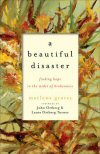
A Beautiful Disaster: Finding Hope in the Midst of Brokenness
- Author: Marlena Graves
- Publisher: Brazos Press
- Publication Date: 2014
- Pages: 224
Interweaving biblical insights and personal narratives, this eloquently written book shows how God often uses suffering and desert experiences to form us into Christ's image. Marlena Graves shares her experiences of growing up poor in a house plagued by mental illness as a means to explore the forces God uses to shape us into beautiful people in the midst of brokenness.
This book offers a window into suffering through the motif of desert spirituality, revealing how God can use our painful experiences to show himself faithful. While no one welcomes suffering, God often uses desert experiences—those we initially despise and wouldn’t wish on anyone—to transform us into beautiful souls who better resemble Jesus. Graves shows how God can bring life out of circumstances reeking of death and destruction, whether those circumstances are crises or daily doses of quiet desperation.
Readers who have experienced suffering and question God’s purpose for it will benefit from this book, as will counselors, pastors, professors, and mentors. It includes a foreword by John Ortberg and Laura Ortberg Turner.
A Beautiful Disaster is an extraordinary debut from one of today’s most promising new authors. In the tradition of the prophets, Marlena Graves sings a wilderness song, seamlessly connecting her own story to both the biblical narrative and the questions, struggles, and joys of all who travel the wilderness road. With a voice that is gentle and strong, passionate and mature, Graves invites the reader to pay attention, to be still and know God. Let those who have ears, hear.
—Rachel Held Evans, author, Faith Unraveled and A Year of Biblical Womanhood
In A Beautiful Disaster Marlena Graves explores the spiritual wilderness with a host of fellow travelers from biblical persona to the ancient church to present company. She mines their wisdom about getting through life’s deserts and eloquently shares lessons she has learned through her own brokenness. There is something here for everyone who has at one time or another wandered in the wilderness and asked ‘Why?’ or ‘How long?’
—Dennis Okholm, professor of theology, Azusa Pacific University; author, Monk Habits for Everyday People and Dangerous Passions, Deadly Sins
To move through brokenness, we need to be both gently reflective and boldly courageous. Marlena Graves combines this unusual blend of necessary pursuits so that we don't simply 'get through it,' but move into a transformed life of flourishing daily in the Kingdom of God.
—Jan Johnson, speaker and author,Invitation to the Jesus Life
Marlena Graves is an op-ed writer for Christianity Today's popular Her.meneutics blog. She is a member of Ink: A Creative Collective, the Redbud Writers Guild, and the Renovaré Spiritual Formation Institute and has written for Christianity Today, Relevant, and the Conversations blog. She has also worked in college residential life and speaks frequently to students and congregations about spiritual formation.
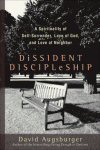
Dissident Discipleship: A Spirituality of Self-Surrender, Love of God, and Love of Neighbor
- Author: David Augsburger
- Publisher: Brazos Press
- Publication Date: 2006
- Pages: 246
In Dissident Discipleship, David Augsburger discerns two dominant strains of spirituality in the modern church. The first is focused on self-growth and self-enlightenment, and the second is focused almost entirely vertically by encouraging a deeper personal relationship with God. While there is a need for care of self and a deeper relationship with God, Augsburger shows that churches must nurture a third type of spirituality that combines the best of the other two types and adds to them a horizontal commitment to love of neighbor manifesting itself in service.
Augsburger points out that this robust form of Christian spirituality has implications that extend well beyond the walls of the church. An active love of God and neighbor, one that is deeply Christian, provides unique and needed answers to contemporary issues such as loneliness and world poverty while helping believers better balance this-worldly and other-worldly horizons. Dissident Discipleship will be a valuable resource to pastors, students, counselors, and all Christians interested in spiritual formation.
Spirituality, worship, evangelism, service, and discipleship have become shibboleths in our religious vocabulary, but how are they related to each other in our everyday Christian experience? With his unusual ability to flesh out the inner essential meanings of our religious vocabulary, David Augsburger, both a pastoral counselor and theologian, depicts a ‘tripolar’ concept of spiritual discipleship that relates to God, our fellow humans, and the world. The great strength of his work is its encompassing definition of discipleship that includes worship, witness, and service; attitude, belief, and behavior; piety, personal values, and ethical response.
—C. Norman Kraus, author, Jesus Christ Our Lord: Christology from a Disciple's Perspective
This ringing call to faithful discipleship forces the contemporary church to make a hard choice: either obedience or apostasy.
—Ron Sider, author,The Scandal of the Evangelical Conscience: Why Are Christians Living Just Like the Rest of the World?
If you thought 'spirituality' was mostly vague fluff and feathers, get this book. Building upon his cruciform Anabaptist tradition, David Augsburger gives us a substantial, faithful look at lives formed by Christ.
—William H. Willimon, coauthor, Resident Aliens: Life in the Christian Colony
David Augsburger was professor of pastoral care and counseling at Fuller Theological Seminary (now retired). He is the author of Caring Enough to Confront and Hate-work: Working through the Pain and Pleasure of Hate.
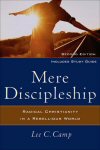
In the clear and compelling fashion of C. S. Lewis’s classic Mere Christianity, Lee Camp here sets forth his vision of what it means to truly follow Christ in the twenty-first century. Drawing on a sound biblical framework of what disciples believe and therefore what they should do, Camp challenges Christians to put obedience to Jesus as Lord ahead of allegiances to all earthly authorities—be they nationalistic, political, economic, or cultural. To Camp, that means loving one's enemies, not killing them; evangelizing by showing Jesus, not just talking about him; and allowing God's grace to transform one’s notions of wealth. This substantially revised and expanded second edition updates examples, adds chapter introductions and summaries, and includes an extensive study guide and a reading guide.
What a book. This is one of those books that you wear out carrying around, marking up, and loaning out. Camp’s words are timeless, and timely. And the crazy thing is this: the church is actually ready to hear them. In post-Religious Right America, there is an entire generation that is not willing to settle for the dream of America over the dream of God. There is a hunger for a Christianity that is not just something we believe but something we live and embody, a church filled not just with believers and worshippers but with disciples. Lee Camp points us towards a Christianity that is worth believing in.
—Shane Claiborne, author of The Irresistible Revolution, coauthor of Jesus for President
Facing being detained by the Australian government for outreach and peace building with those listed as terrorists, I found myself asking ‘How did I get here?!’ Lee Camp and his book Mere Discipleship have given me the confidence to listen to the still, small voice answer ‘By following me.’ This book is for those who might dare to believe in a Messiah who conquers not by the sword of war, but by a towel of service. A savior who makes holy not by exclusion, but by embrace. A church which is a sign of not what went wrong, but what God wills the world to be. A cross whose offensive is not a divine demand for blood, but the divine foolishness of God's unarmed love conquering death. A gospel not fire insurance for the afterlife, but of God's reign coming ‘on earth as in heaven.’ In short this book is for those who long for a Christianity that looks like Christ and seeks to witness to God’s dream for creation—the kingdom of God.
—Jarrod McKenna, cofounder of The Peace Tree Community, founder of Empowering Peacemakers in Your Community [EPYC]
Mere Discipleship is the best single book on Christian discipleship I've ever read. Lee Camp insightfully dismantles the Christendom paradigm of Christian living to disclose what being an authentic disciple of Jesus looks like. It’s brilliant. I couldn’t recommend a book more than I recommend this one!
—Gregory A. Boyd, author of The Myth of a Christian Nation
Lee C. Camp (PhD, University of Notre Dame) is professor of theology and ethics at Lipscomb University in Nashville, Tennessee. He is the author of Mere Discipleship and the host of Tokens, a popular radio show based in Nashville. Camp speaks regularly to university and church audiences and has served in various ministry roles in Tennessee, Kentucky, Indiana, and Nairobi, Kenya.
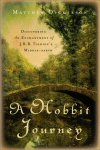
A Hobbit Journey: Discovering the Enchantment of J. R. R. Tolkien’s Middle-Earth
- Author: Matthew Dickerson
- Publisher: Brazos Press
- Publication Date: 2012
- Pages: 272
In this engaging and thought-provoking book, Tolkien expert Matthew Dickerson shows how a Christian worldview and Christian themes undergird Tolkien’s Middle-earth writings and how they are fundamentally important to understanding his vision. This revised and expanded edition of Following Gandalf includes new material on torture, social justice, and the importance of the body.
What are the costs of military victory? Is mercy sometimes too expensive? Can torture ever be justified? Are there any moral absolutes in a world of competing faiths and cultures? Matt Dickerson’s A Hobbit Journey traces these and many other issues through their surprisingly detailed presentation in Tolkien’s fiction. If anyone should still doubt Tolkien’s applicability and relevance to the twenty-first century, this is the book to put in their hands.
—Thomas Shippey, author, J. R. R. Tolkien: Author of the Century
Most fantasy novels are like amusement parks—full of familiar sights, sounds, smells, and thrills. But J. R. R. Tolkien’s stories, which have inspired legions of imitators, offer much more than amusement. They are countries full of treasure that will go undiscovered and unappreciated unless we learn how to be attentive treasure hunters. Matthew Dickerson writes as one who has spent his summers in the Shire, hiked every trail in Mirkwood Forest, taken counsel from Gandalf, and argued with Gollum and Smaug. It's as though he sharpened the tools of his intellect in deep conversation with Tolkien himself. He will prove to be a thought-provoking guide through Middle-earth whether you’re a frequent visitor there or a newcomer ready for the adventure of a lifetime.
—Jeffrey Overstreet, author,Auralia's Colors and Through a Screen Darkly
A Hobbit Journey instantly engages readers with its combination of scholarly knowledge and love for J. R. R. Tolkien’s work. Matthew Dickerson resists imposing his own rigid, limiting thesis and instead interprets the text by simply pointing out to fellow readers what is there. In doing so he illuminates the power of Tolkien’s stories to challenge, delight, and transform us.
—Colin Duriez, author of Tolkien and C. S. Lewis: The Gift of Friendship and J. R. R. Tolkien: The Making of a Legend
Matthew Dickerson is professor of computer science and environmental studies at Middlebury College in Middlebury, Vermont, and a popular speaker on Tolkien. He directs the New England Young Writers’ Conference at Bread Loaf and is the author of From Homer to Harry Potter; The Mind and the Machine; Narnia and the Fields of Arbol; and Ents, Elves, and Eriador.
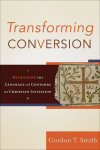
Transforming Conversion: Rethinking the Language and Contours of Christian Initiation
- Author: Gordon T. Smith
- Publisher: Baker Academic
- Publication Date: 2010
- Pages: 224
This volume offers much-needed contemporary theological reflection on the phenomenon of conversion and transformation. Gordon Smith provides a robust evaluation that covers the broad range of thinking about conversion across Christian traditions and addresses global contexts. Smith contends that both in the church and in discussions about contemporary mission, the language of conversion inherited from revivalism is inadequate in helping to navigate the questions that shape how we do church, how we approach faith formation, how evangelism is integrated into congregational life, and how we witness to the faith in non-Christian environments. We must rethink the nature of the church in light of how people actually come to faith in Christ. After drawing on ancient and pre-revivalist wisdom about conversion, Smith delineates the contours of conversion and Christian initiation for today’s church. He concludes with a discussion of the art of spiritual autobiography and what it means to be a congregation.
Transforming Conversion will be useful in evangelism, spirituality, missions, ecclesiology, soteriology, and practical ministry courses. Pastors, church leaders, and thoughtful lay readers will also appreciate this book.
Transforming Conversion is a welcome addition to the growing literature on conversion. With great skill, Smith explores the fields of biblical studies, theology, church history, and religious biography to develop new language to capture the complexity of conversion. Unwilling to be confined to the outdated and inaccurate language of revivalism, Smith articulates a holistic understanding of conversion to guide renewed modes of outreach for a church often paralyzed toward evangelism in the twenty-first century.
—Richard Peace, Robert Boyd Munger Professor of Evangelism and Spiritual Formation, Fuller Theological Seminary
This is an important book and full of surprises. What appears to be a simple historical survey of ‘conversion literature’ turns into a serious work on the theology of conversion. Transforming Conversion is of ecumenical interest because Smith's attention to the doctrinal and sacramental aspects of conversion goes far to bridge the divide separating evangelicals from Orthodox and Catholic believers. It is heartily recommended.
—Patrick Henry Reardon, senior editor, Touchstone: A Journal of Mere Christianity
Gordon T. Smith is president of Ambrose University College and Seminary in Calgary, Alberta. He is also the president of reSource Leadership International and has taught at Regent College, Vancouver. He is the author of many books, including Beginning Well and A Holy Meal.
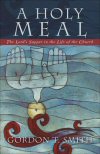
A Holy Meal: The Lord's Supper in the Life of the Church
- Author: Gordon T. Smith
- Publisher: Baker Academic
- Publication Date: 2005
- Pages: 124
The Lord’s Supper refuses the rolling pin. It cannot be flattened into something of our own making. In the Lord’s Supper, the Triune God breaks out of the boxes we construct in vain to domesticate Father, Son, and Holy Spirit.
That is the message of Gordon Smith’s A Holy Meal. He writes with the conviction that the holy meal instituted by Jesus continues to challenge our assumptions about the Christian life by showing us who God really is and how God comes to us in the acts of breaking the bread and sharing the cup.
A Holy Meal unpacks the many fruitful meanings of the Lord’s Supper, showing why they should be more prominent in the lives of individual believers and in the broader covenant community. The author’s irenic approach allows for ecumenical dialogue and celebration of the varied streams of the Christian tradition and gives attention to actual Christian practice of the Lord’s Supper, showing how different expressions can shed light on theological principles.
Hunger and thirst for the gift of the Lord’s Supper is an encouraging sign of congregational renewal in many churches. A growing interest in the theology of the Lord’s Supper is a hopeful indication of lively and ecumenical theological conversation. Smith’s book, a pastorally aware and theologically rich statement of the Lord’s Supper, is a valuable contribution to both congregational renewal and theological conversation.
—Leanne Van Dyk, academic dean and professor of Reformed theology, Western Theological Seminary
Smith’s A Holy Meal demonstrates the richness of a thorough integration of exegetical, biblical, systematic, and practical theology. In the book, he sensitively leads readers on a journey of revisiting the key biblical texts, theological themes, and ecclesial traditions related to the Lord’s Supper. The exegesis is accurate, the theology is wise, and the implications are transformative for every Christian’s walk of faith. This is a must read for all those searching for the significance of this regular rhythm in the worship of the church.
—Mark J. Boda, professor of Old Testament, McMaster Divinity College
In a manner that is both trenchant and engaging, Smith calls on Christians to reconsider and embrace the holy meal ordained by Christ. Writing both to the contemporary Christian who may be skeptical of rites and to the believer who senses that the Lord’s Supper is central to the Christian walk but does not know why, the author takes readers through Scripture and church history, demonstrating the significance of this corporate action.
—Edith M. Humphrey, associate professor of New Testament studies, Pittsburgh Theological Seminary
Gordon T. Smith is president of Ambrose University College and Seminary in Calgary, Alberta. He is also the president of reSource Leadership International and has taught at Regent College, Vancouver. He is the author of many books, including Beginning Well and A Holy Meal.
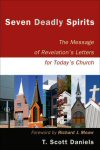
Seven Deadly Spirits: The Message of Revelation’s Letters for Today's Church
- Author: T. Scott Daniels
- Publisher: Baker Academic
- Publication Date: 2009
- Pages: 160
In Seven Deadly Spirits, T. Scott Daniels contends that corporate bodies like churches form an individual spiritual personality of sorts, incarnating an angelic spirit that is the essence of a congregation. Cultural influences can impact the collective spirit or attitude of a congregation, either hindering it from becoming all God intends it to be or setting it free to glorify God.
Building on the work of Hendrikus Berkhof, Walter Wink, and Nancey Murphy, this engaging study provides a lens through which to understand the nature and function of the seven “angels” of the churches addressed in the book of Revelation. These seven angels, or deadly spirits, represent key areas of struggle that were destructive in the early church and continue to damage contemporary congregations. Seven Deadly Spirits renarrates into a contemporary context the seven angels that hinder the church, providing a rich category for analysis through which to discern the influences that can affect congregations. The book encourages professors and students in pastoral ministry, theology, and church growth courses as well as working pastors and lay leaders to consider a systems approach to church leadership—one that takes seriously the “powers” at work within local congregations—and offers suggestions for transformation.
Scott Daniels has given us a fascinating look at Revelation’s seven churches. In the process, he provides us with a unique look at our own church today. A challenging and helpful book.
—William H. Willimon, bishop, North Alabama Conference, United Methodist Church
Drawing on pastoral wisdom, Daniels helps us see the life of the church through John’s letters to the seven churches in the book of Revelation. This is not a task easily done, but with great insight he helps us see ourselves as we are, not as we would like to be. We need all the help we can get and this book certainly helps.
—Stanley Hauerwas, Gilbert T. Rowe Professor of Theological Ethics, Duke University
As we seek renewal in the North American church, we need more than cultural analysis or theological critique. We must address the consumerism, social arrogance, and other ‘deadly spirits’ taking over our churches by clearly proclaiming the Word of God concerning these issues. In Seven Deadly Spirits, Scott Daniels offers such a message drawn from the seven letters of Revelation. With compelling clarity and incisive scholarship, Daniels unfurls the meaning of these letters for the missional church today. Under Daniels’s scholarly guidance, the letters to the churches in Revelation become a prime scriptural resource for conforming the church more faithfully to the mission of God.
—David Fitch, B. R. Lindner Chair of Evangelical Theology, Northern Seminary; author of The Great Giveaway
T. Scott Daniels (PhD, Fuller Theological Seminary) is dean of the School of Theology at Azusa Pacific University in Azusa, California, and senior pastor of First Church of the Nazarene in Pasadena. He previously taught at Southern Nazarene University in Oklahoma City.
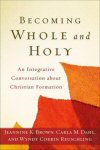
Becoming Whole and Holy: An Integrative Conversation about Christian Formation
- Author: Jeannine K. Brown, Carla M. Dahl, and Wyndy Corbin Reuschling
- Publisher: Baker Academic
- Publication Date: 2011
- Pages: 214
How does Christian formation happen and what are its moral implications? This text brings into conversation three disciplines that are crucial for Christian formation—social science, biblical studies/hermeneutics, and ethics—to present a cohesive, dynamic vision of human wholeness and spiritual holiness. Drawing upon research in these three disciplines, the authors weave together insights from their respective fields to address the relationship between personal and communal formation, moral development, and the interpretation of Scripture. Becoming Whole and Holy reveals the process as well as the fruits of interdisciplinary dialogue, offering a fresh approach to understanding human formation. The final chapter, a case study on immigration, demonstrates the authors' integrative method. The book will be of use in spiritual formation, pastoral counseling, ethics, and hermeneutics courses and it will also be of interest to pastors, lay leaders, and counselors.
Becoming fully human before God and within the world cannot be a solitary pilgrimage. It should be a journey taken in community, a sharing among friends who together seek to know themselves and their Lord better and to minister more faithfully. In this book, a biblical scholar, a social scientist, and an ethicist sharpen one another’s appreciation of this need for constructive interdependence and integration. Pull up a chair and listen to this quality conversation.
—M. Daniel Carroll R., distinguished professor of Old Testament, Denver Seminary; author, Christians at the Border: Immigration, the Church, and the Bible
This is not just a book about Christian formation. In a surprising way, it also traces the paths of becoming whole and holy as its authors model their own growth in their interactions with one another. The process of offering and receiving guidance, the sculpting of practical wisdom, and the integrative journey itself are laid bare for all to see—and to follow. Here is a conversation worth joining!
—Joel B. Green, professor of New Testament interpretation, Fuller Theological Seminary
Becoming Whole and Holy is a compelling integrative conversation about spiritual formation that weaves together themes from theology and the social sciences in a very helpful way. This remarkably broad and balanced book offers real wisdom about both the end of spiritual formation and the means of getting there.
—James C. Wilhoit, Scripture Press Professor of Christian Formation and Ministry, Wheaton College; author, Spiritual Formation as if the Church Mattered
Jeannine K. Brown is professor of New Testament at Bethel Seminary and author of Scripture as Communication: Introducing Biblical Hermeneutics and The Disciples in Narrative Perspective: The Portrayal and Function of the Matthean Disciples. She contributed to The Baker Illustrated Bible Commentary and has written for publications such as Journal of Biblical Literature and Catholic Biblical Quarterly.
Carla M. Dahl is professor of congregational and community care leadership at Luther Seminary. She has written for the Journal of Psychology and Theology and contributed to several books, including Leading from Within, Research Methods in Family Therapy, and the forthcoming Dictionary of Christian Spirituality.
Wyndy Corbin Reuschling is professor of ethics and theology at Ashland Theological Seminary. She is the author of Reviving Evangelical Ethics: The Promises and Pitfalls of Classic Models of Morality and has written for publications such as The Journal of the Society of Christian Ethics and Ashland Theological Journal.
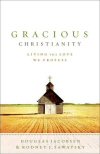
Gracious Christianity: Living the Love We Profess
- Author: Douglas Jacobsen and Rodney J. Sawatsky
- Publisher: Baker Academic
- Publication Date: 2006
- Pages: 144
In today’s postmodernist and relativistic culture, Christians must contend with being perceived as argumentative, vindictive, and petty—along with the criticism that religion, in general, is a source of violence and destruction. These pejorative labels and connotations do not resonate with the fruit of the Spirit or with Christ’s mandate to love God and neighbor.
But graciousness is a nonnegotiable dimension of Christian faith. It goes to the very core of the gospel. It is what makes the gospel good news. Without grace and graciousness, Christianity loses its message. In this book, Douglas Jacobsen and Rodney Sawatsky offer a succinct proposal to recover Gracious Christianity. It is a concise but relatively comprehensive overview of Christian beliefs showing how historic Christianity supports graciousness in faith and life. The eight chapters cover God and creation, humankind, hearing God’s voice, the fullness of salvation, the Spirit and life, being church, the Bible, and the future.
Gracious Christianity will be used in undergraduate and graduate religion and theology classes, and it will serve as either an introduction to or a reminder of “the living faith” for believers from various traditions. Its broad-minded and ecumenical spirit will grant it a comfortable home in the academy and the church.
Gracious Christianity is a beautiful, intelligent, and readable introduction to Christian faith. It will be of help to people approaching the faith for the first time, eager to see it as a grace-filled and peaceable way of life and not as an argumentative and tensely-held dogma. It will also be a great help to people who are Christians but want to get a fresh vision of what their faith can mean in their lives and in our world.
—Brian McLaren, pastor and author
I have never read a more lucid and compelling summary of the Christian faith. With its story of grace and love mixed with conviction and commitment, this is a book to ponder in one’s heart, to discuss with one's friends, and to savor for a lifetime. If I were not a Christian, I might very well want to become one based on my reading of this text.
—Richard T. Hughes, distinguished professor of religion, Messiah College
Gracious Christianity is itself a gracious gift to all of us. In a spirit of loving simplicity, the authors offer us marvelous insights into the Christian life. This is a book to read and reread!
—Richard J. Mouw, president and professor of Christian philosophy, Fuller Theological Seminary
Douglas Jacobsen is distinguished professor of church history and theology at Messiah College in Grantham, Pennsylvania. He has authored or coauthored such books as Scholarship and the Christian Faith and the award-winning Thinking in the Spirit.
Rodney J. Sawatsky was an administrator for church-related colleges for more than twenty years. He served as president of Messiah College from 1994 to 2004 and was the author of numerous scholarly articles.
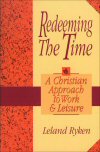
Redeeming the Time: A Christian Approach to Work and Leisure
- Author: Leland Ryken
- Publisher: Baker Academic
- Publication Date: 1995
- Pages: 304
This fully developed biblical perspective of work and leisure finds the enjoyment of both as a holistic balance often missing today.
Leland Ryken is professor emeritus of English at Wheaton College in Wheaton, Illinois, and the author or editor of nearly forty books, including Words of Delight: A Literary Introduction to the Bible.
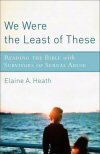
We Were the Least of These: Reading the Bible with Survivors of Sexual Abuse
- Author: Elaine A. Heath
- Publisher: Brazos Press
- Publication Date: 2011
- Pages: 208
Much of what is written about abuse and the Bible focuses on the ways Scripture is used to hurt rather than heal. This accessibly written book provides a much-needed perspective, illuminating the good news of healing and liberation that the Bible offers survivors of sexual abuse. As a theologian and survivor of abuse herself, Elaine Heath handles this sensitive topic with compassion and grace. She offers a close reading of several biblical passages that have proven to be profoundly healing for her and for other survivors. The book is illustrated with stories and insights from sexual abuse survivors who have experienced healing through the Bible in order to bring hope and encouragement to victims. It will be welcome reading for those who have suffered from abuse as well as for pastors, counselors, therapists, and others who minister to them. Each chapter ends with two sets of reflection questions and recommended activities—one set for survivors and another for those who journey with them.
The journey toward healing can be a lonely one for survivors of sexual abuse who feel—and often are treated—like 'the least of these' children of God. Imagine the surprise ending: Jesus himself was the least of these! For Elaine Heath, this ending is just the beginning. This book fills a gap in the literature and I affirm its value as a professor, pastoral counselor, and minister.
—Jeanne Stevenson-Moessner, professor of pastoral care, Perkins School of Theology, Southern Methodist University; fellow, American Association of Pastoral Counselors
Sexual trauma survivors have long felt uncomfortable, out of place, and even ostracized within the church. For many victims, reading the Bible is a painful and even re-victimizing experience. Finally, Elaine Heath has provided a welcome reframing of Scripture for survivors of sexual abuse. We Were the Least of These offers a compassionate, theologically sound reading of biblical stories and shares a healing, redemptive perspective. As a survivor of sexual abuse and a counselor who has worked with hundreds of hurting victims, I highly recommend We Were the Least of These and thank the author for her invaluable contribution to our healing.
—Marnie C. Ferree, executive director, Bethesda Workshops for Sexual Addiction Recovery; author, No Stones: Women Redeemed from Sexual Addiction
Join Elaine Heath in reading the Bible from the perspective of survivors of sexual abuse and see texts in ways you have not seen them before. This is not, however, just a book of new insights. Heath skillfully and pastorally weaves together biblical stories, stories of survivors, and reflection questions. It is a healing, liberating, life-giving book.
—Mark D. Baker, associate professor of mission and theology, Fresno Pacific Biblical Seminary; author, Proclaiming the Scandal of the Cross
Elaine A. Heath is McCreless Associate Professor of Evangelism and director of the Center for Missional Wisdom at Perkins School of Theology, Southern Methodist University, in Dallas, Texas. An ordained elder in the United Methodist Church, she is a frequent retreat speaker and has experience as a pastor and spiritual director. She is also the author of The Mystic Way of Evangelism.